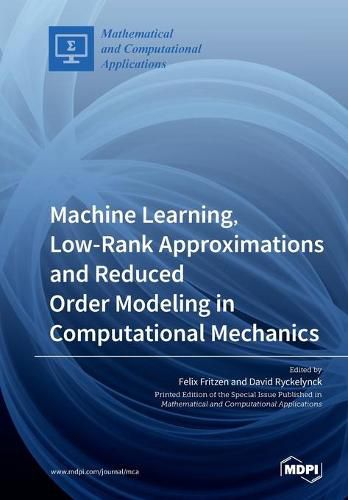Readings Newsletter
Become a Readings Member to make your shopping experience even easier.
Sign in or sign up for free!
You’re not far away from qualifying for FREE standard shipping within Australia
You’ve qualified for FREE standard shipping within Australia
The cart is loading…






This title is printed to order. This book may have been self-published. If so, we cannot guarantee the quality of the content. In the main most books will have gone through the editing process however some may not. We therefore suggest that you be aware of this before ordering this book. If in doubt check either the author or publisher’s details as we are unable to accept any returns unless they are faulty. Please contact us if you have any questions.
The use of machine learning in mechanics is booming. Algorithms inspired by developments in the field of artificial intelligence today cover increasingly varied fields of application. This book illustrates recent results on coupling machine learning with computational mechanics, particularly for the construction of surrogate models or reduced order models. The articles contained in this compilation were presented at the EUROMECH Colloquium 597,
Reduced Order Modeling in Mechanics of Materials , held in Bad Herrenalb, Germany, from August 28th to August 31th 2018. In this book, Artificial Neural Networks are coupled to physics-based models. The tensor format of simulation data is exploited in surrogate models or for data pruning. Various reduced order models are proposed via machine learning strategies applied to simulation data. Since reduced order models have specific approximation errors, error estimators are also proposed in this book. The proposed numerical examples are very close to engineering problems. The reader would find this book to be a useful reference in identifying progress in machine learning and reduced order modeling for computational mechanics.
$9.00 standard shipping within Australia
FREE standard shipping within Australia for orders over $100.00
Express & International shipping calculated at checkout
This title is printed to order. This book may have been self-published. If so, we cannot guarantee the quality of the content. In the main most books will have gone through the editing process however some may not. We therefore suggest that you be aware of this before ordering this book. If in doubt check either the author or publisher’s details as we are unable to accept any returns unless they are faulty. Please contact us if you have any questions.
The use of machine learning in mechanics is booming. Algorithms inspired by developments in the field of artificial intelligence today cover increasingly varied fields of application. This book illustrates recent results on coupling machine learning with computational mechanics, particularly for the construction of surrogate models or reduced order models. The articles contained in this compilation were presented at the EUROMECH Colloquium 597,
Reduced Order Modeling in Mechanics of Materials , held in Bad Herrenalb, Germany, from August 28th to August 31th 2018. In this book, Artificial Neural Networks are coupled to physics-based models. The tensor format of simulation data is exploited in surrogate models or for data pruning. Various reduced order models are proposed via machine learning strategies applied to simulation data. Since reduced order models have specific approximation errors, error estimators are also proposed in this book. The proposed numerical examples are very close to engineering problems. The reader would find this book to be a useful reference in identifying progress in machine learning and reduced order modeling for computational mechanics.